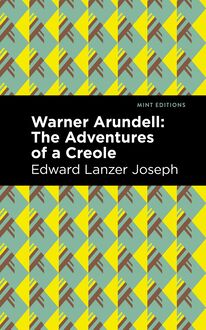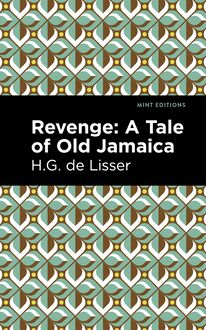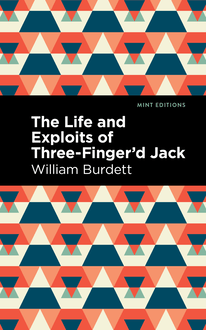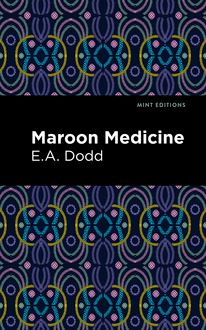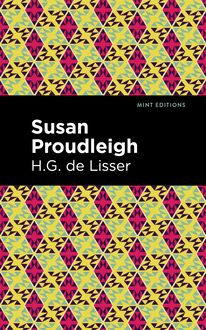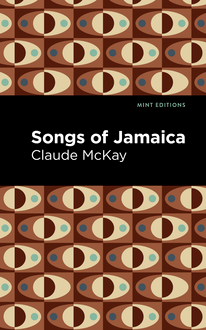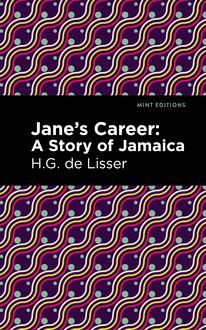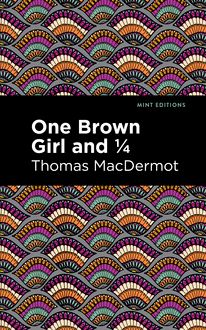-
 Univers
Univers
-
 Ebooks
Ebooks
-
 Livres audio
Livres audio
-
 Presse
Presse
-
 Podcasts
Podcasts
-
 BD
BD
-
 Documents
Documents
-
- Cours
- Révisions
- Ressources pédagogiques
- Sciences de l’éducation
- Manuels scolaires
- Langues
- Travaux de classe
- Annales de BEP
- Etudes supérieures
- Maternelle et primaire
- Fiches de lecture
- Orientation scolaire
- Méthodologie
- Corrigés de devoir
- Annales d’examens et concours
- Annales du bac
- Annales du brevet
- Rapports de stage
La lecture à portée de main
Vous pourrez modifier la taille du texte de cet ouvrage
Découvre YouScribe en t'inscrivant gratuitement
Je m'inscrisDécouvre YouScribe en t'inscrivant gratuitement
Je m'inscrisEn savoir plus
Vous pourrez modifier la taille du texte de cet ouvrage
En savoir plus

Description
Warner Arundell: The Adventures of a Creole (1838) is a novel by Edward Lanzer Joseph. Published in the last year of Joseph’s life, the novel claims to be an edited version of the memoirs of Warner Arundell, a Creole lawyer and doctor from Grenada. A common literary trope of the time, this grants a modicum of authority to the author while maintaining his distance from events that may have been drawn from his own experiences. Believed to be the first novel set in Trinidad, Warner Arundell: The Adventures of a Creole is a groundbreaking work of Caribbean literature that continues to inform readers of the Creole experience in the Americas. “As we entered the town, I was absolutely rendered giddy by the opulence and grandeur of the shops, the thronging of the population, and the deafening noise; while the smoky atmosphere, unlike aught I ever before beheld, weighed down my spirits.” When an encounter with fraudulent lawyers leaves him penniless, he travels to Venezuela and England to study law and medicine before returning to the New World in search of fortune. Along the way, he embarks on several adventures, meets the African-descended side of his family, and falls in love with a beautiful Venezuelan woman. Originally written to shed light on the “many abuses in [the] West Indian Colonial System,” the novel has since been recognized as a pioneering work of Caribbean literature which continues to inform the postcolonial perspective on race, class, and identity in the British colonial era. With a beautifully designed cover and professionally typeset manuscript, this edition of Edward Lanzer Joseph’s Warner Arundell: The Adventures of a Creole is a classic of Caribbean literature reimagined for modern readers.
Sujets
Informations
| Publié par | Mint Editions |
| Date de parution | 28 septembre 2021 |
| Nombre de lectures | 0 |
| EAN13 | 9781513210797 |
| Langue | English |
| Poids de l'ouvrage | 1 Mo |
Informations légales : prix de location à la page 0,0500€. Cette information est donnée uniquement à titre indicatif conformément à la législation en vigueur.
Extrait
Warner Arundell
The Adventures of a Creole
Edward Lanzer Joseph
Warner Arundell: The Adventures of a Creole was first published in 1838.
This edition published by Mint Editions 2021.
ISBN 9781513211992 | E-ISBN 9781513210797
Published by Mint Editions®
minteditionbooks.com
Publishing Director: Jennifer Newens
Design & Production: Rachel Lopez Metzger
Project Manager: Micaela Clark
Typesetting: Westchester Publishing Services
To
The Right Honorable
L ORD B ARON G LENELG ,
Her Majesty’s Principal Secretary of State for the Colonies.
M Y L ORD ,
S HOULD your Lordship condescend to honor these Volumes with a perusal, their Author flatters himself they will direct your attention to many abuses in our West Indian Colonial System, which call loudly for correction. The hope of bringing some of them under your notice, has induced me to take the liberty of inscribing this Work to your Lordship.
I have the honor to be,
M Y L ORD ,
Your Lordship’s humble Servant,
E DWARD L. J OSEPH
P ORT OF S PAIN , T RINIDAD ,
Aug . 20, 1837
C ONTENTS I NTRODUCTION V OLUME I I II III IV V VI VII VIII IX X XI XII XIII XIV XV XVI XVII XVIII XIX XX XXI XXII XXIII XXIV V OLUME II I II III IV V VI VII VIII IX X XI XII XIII V OLUME III I II III IV V VI VII VIII IX X XI XII XIII XIV XV XVI
I NTRODUCTION
P reviously to submitting the following narrative to the reader, it is necessary to inform him that it is taken from a very voluminous manuscript, which partakes of the mixed nature of memoirs, a journal, an autobiography, and a collection of letters and essays. These bore, in their title-page, the following inscription: “The Life, Adventures, and Opinions, of Warner Arundell, Esquire.”
The Editor of these volumes thinks it his duty to inform the Public under what circumstances he came into possession of these papers of Mr. Arundell. In giving this information, he prefers speaking of himself in the first person singular, rather than assuming the right of Editors and Kings,—viz. to talk of themselves in the plural number.
Amongst a thousand and one literary projects which I had formed, one was to write a history of the war of the independence of Columbia, Mexico, Peru, Chili, and Buenos Ayres. When I designed this Work, I considered more what ought to be done than what I was able to accomplish. The paucity of materials for compiling a good account of this most momentous occurrence, renders it necessary for him who would undertake to become the historian of this important revolution, to visit all the principal cities on the great South American continent; in order to inspect such few scattered records as were preserved during this most sanguinary civil war, and to consult with all the surviving chiefs who figured in the contest, whether living in the New World or in Europe. To do this required leisure and a fortune, neither of which I possessed. Hence, I was obliged to abandon my project—certainly for the present, probably forever.
During my various and generally fruitless attempts to obtain materials for my projected history, a friend suggested that, as Mr. Warner Arundell had spent some years on the Main, during a most interesting period of the wars of Columbia, he might be able to give me some information on the subject; especially as it was known that Mr. Arundell had of late commenced journalising.
My acquaintance with the Gentleman who is the hero of these volumes, commenced twenty years since. I first met him in London, in the house of Don Louis Mendez. After this, I became his companion during a remarkable voyage across the Atlantic, recorded in the second volume of this Work. We separated on our arrival in Trinidad, and did not meet again for some years: subsequently we both were residents of this colony; but, living far from each other, we seldom met.
During this residence of Mr. Arundell in Trinidad, he was the subject of a most disgraceful persecution. He left the island, but returned in a few months, possessed of a very large fortune, and here married a most amiable and lovely Spanish creole.
But, notwithstanding our old acquaintance, I applied to him for the information I required with some reluctance; for, although I was one of those who refused to join in the frantic and disgraceful hue-and-cry against him, yet fortune had placed us in very different situations. He was in the possession of great wealth; I, after many years’ residence here, was in an humble situation. But I still took the resolution of waiting on him. I sent my name to him: he came to me. The instant I beheld him, I perceived I had wronged him by my diffidence. He did not receive me as some rich men meet an old acquaintance, who has been subject to harsh treatment from fortune. No; he took my hand as that of an old friend, who had dared to defend him when he was assailed by calumny.
In Mr. Warner Arundell I perceived a man who had been proud in adversity, unbending when suffering under persecution, but affable and amiable in prosperity; one who endeavoured to forget injuries, and sincerely forgave insults, although he possessed “the memory of the heart,” as gratitude has been beautifully denominated.
On making him acquainted with the cause of my visit, he immediately offered to put me in possession of that part of his journal which related to his adventures in the patriot camp: and he informed me, that, by looking through his papers, amongst a load of dross I might find some ore, from which useful metal might be extracted. He, however, added,—
“I fear you will not have the phlegm to inspect all my papers.”
“Never doubt that,” was my reply; “I have had perseverance to read through the whole of Abb é Raynal’s historical romance.”
“That,” said my friend, “was rather a trial on your credulity than on your patience: my voluminous manuscripts will put your application to a much severer test.”
On my persisting to request that he would allow me to read his manuscripts, he took from a chest a mass of papers of truly alarming bulk and weight. They consisted of thirteen hundred and seventy-eight sheets of foolscap, closely written; to compile which, he had employed the leisure time of some years.
Lest the reader should wonder what there was in the life of this worthy Gentleman that required so much time and paper to record its incidents and reflections, I must explain, that he possessed a most powerful memory. Everything he had heard, seen, read, or thought, he seemed to recollect, when compiling his voluminous manuscripts. For example, he opens his journal with an account of the first settlement of his family in the West Indies. This induces him to give a history of the Bucaniers, and an immense number of anecdotes of all the old families in the West Indies; with a vast variety of traditional stories, which relate to the Arundells, and the descendants of Sir Thomas Warner, the first English governor of St. Christopher’s, who was his maternal ancestor. In short, the part of the narrative which I have abridged into the first short chapter of the first volume, takes up so much space in his manuscripts, that, if it were printed verbatim, it would be equal in length to the whole of that volume.
In the progress of his Work he gives the whole history of the two Maroon wars in Jamaica; an account of the rise, progress, and termination of the wars in the West Indies consequent on the French revolution: he carefully transcribes every letter that he ever received or wrote, and all remarkable conversations that he ever heard: he gives his thoughts on a vast variety of subjects, and relieves the narrative with all kinds of essays on various matters which came within the scope of his observation; such as, on the mode of education in Caraccas; on militia training; on naval and military affairs; on medical education in London; on the practice of physic in the West Indies, &c. In short, his voluminous journal embraces a number of treatises, which, however unfit they may be to publish in an autobiography, I may one day print, under the title of the ‘Arundell Papers;’ as this Gentleman has given up his Work to me for my own advantage.
But I anticipate. I kept the papers of Mr. Arundell until I abandoned all idea of writing my projected history. I then returned them. At the same time I informed the worthy autobiographer, that, if he would take the trouble of extracting from his M SS . that which might not be improperly denominated the personal narrative, it would form a moral, and, I believed, a not uninteresting production.
“Have you,” said he, “any inclination to make the abridgement yourself? it will be an easier task than to write history, and, during the present age of light reading, a more direct road to fame.”
I at first declined this proposition, saying that he might get others to do more justice to his papers. To this he replied, that I was the only person he had met with in the colonies who shewed a disposition to pursue literature as a profession; and that, if he sent his manuscript to England, its bulk would frighten any Publisher or Editor. Perhaps a few scattered essays might find their way into the periodicals of the day, or a few stories would be trimmed and dressed up by literary caterers for the monthly appetites of readers of magazines; these same purveyors being so utterly ignorant of West India manners, feeling, and even climate, that the most egregious blunders would be introduced into every paragraph. In short, Mr. Arundell prevailed on me to undertake the task which I had suggested to him.
I really believe that his motive for urging me to become the Editor of his production was, that he hoped its publication would be productive of profit to me. This, with a delicacy of feeling which has always characterised him, he never mentioned. One condition alone he attached to the leave he gave me to publish a part of his journal: it was, that whenever I wrote of living persons, or of those recently dead, I s
-
 Univers
Univers
-
 Ebooks
Ebooks
-
 Livres audio
Livres audio
-
 Presse
Presse
-
 Podcasts
Podcasts
-
 BD
BD
-
 Documents
Documents
-
Jeunesse
-
Littérature
-
Ressources professionnelles
-
Santé et bien-être
-
Savoirs
-
Education
-
Loisirs et hobbies
-
Art, musique et cinéma
-
Actualité et débat de société
-
Jeunesse
-
Littérature
-
Ressources professionnelles
-
Santé et bien-être
-
Savoirs
-
Education
-
Loisirs et hobbies
-
Art, musique et cinéma
-
Actualité et débat de société
-
Actualités
-
Lifestyle
-
Presse jeunesse
-
Presse professionnelle
-
Pratique
-
Presse sportive
-
Presse internationale
-
Culture & Médias
-
Action et Aventures
-
Science-fiction et Fantasy
-
Société
-
Jeunesse
-
Littérature
-
Ressources professionnelles
-
Santé et bien-être
-
Savoirs
-
Education
-
Loisirs et hobbies
-
Art, musique et cinéma
-
Actualité et débat de société
- Cours
- Révisions
- Ressources pédagogiques
- Sciences de l’éducation
- Manuels scolaires
- Langues
- Travaux de classe
- Annales de BEP
- Etudes supérieures
- Maternelle et primaire
- Fiches de lecture
- Orientation scolaire
- Méthodologie
- Corrigés de devoir
- Annales d’examens et concours
- Annales du bac
- Annales du brevet
- Rapports de stage
